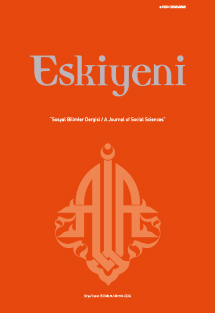Batıl İtikatlarla Savaşın Edebî Cephesi: Kılıçzâde Hakkı’nın Hikâyeleri
The Literary Front of the War Against Superstition: Kılıçzāde Hakkı's Stories
Author(s): Tuğba ÖzenSubject(s): Language and Literature Studies, Theology and Religion, Islam studies
Published by: Anadolu İlahiyat Akademisi
Keywords: Turkish Islamic Literature; Kılıçzâde Hakkı; Westernism; Bigotry; Family; Superstition; Fighting Superstition;
Summary/Abstract: Kılıçzāde Hakkı was a writer, journalist, member of parliament, and advocate of Westernism, who played a significant role in Turkish intellectual history. Kılıçzāde's writings describe the necessary steps for the progress of the state in a manner that reflects his name, as if he were fighting for it. Although most studies about the author focus on his books and articles, Kılıçzāde Hakkı also narrated his struggle against superstition, which he saw as the primary cause of regression, by carrying it to fictional ground. Even though these stories are mentioned in the studies on Kılıçzāde, a detailed evaluation has not been made. This study analyses eight stories of Kılıçzāde Hakkı that were published in the magazines İçtihad and Hürriyet-i Fikriyye. The author's struggle with superstition, religious, and social beliefs is highlighted in the stories. It can be argued that Kılıçzāde continued the intellectual struggle he began in his written works by addressing similar issues in his articles. This study aims to to demonstrate that Kılıçzāde extended the struggle he initiated in his intellectual works to the literary structure and to exemplify the use of fiction in explaining his thoughts. The methodology of the study proceeded in the following stages: identifying the author's stories, transferring them to the Latin alphabet, and finding similarities between his articles and stories. The study was analyzed under three headings. In this context, the eight stories about marriage were analyzed under the title “Are we eligible to get married?”, the stories criticizing the perception of religiosity and irreligion in the society were analysed under the title “Signs of Irreligion”, and the stories about Yunus Hodja were analyzed under the title "The Symbol of Bigotry: Yunus Hodja". It is evident from his writings that Kılıçzâde Hakkı placed great importance on the concept of family. The author discusses wedding festivities, the importance of spouses getting to know each other before getting married, and the procedures for marriage and divorce in the stories titled “Are we eligible to get married?”. The stories analyzed under the title “Signs of Irreligion” explore the attitudes of families labeled as irreligious by society. Kılıçzāde, who considered it his duty to combat false sentimentality on multiple fronts, extended this battle to the realm of fiction. The third section of the manuscript, entitled “The Symbol of Bigotry: Yunus Hodja”, comprises three stories that recount the adventures of Yunus Hodja. The first story explores Yunus Hodja's ancestry, the second his life as a madrasah student and the third his dispute with a woman. Based on these evaluations, it was seen that Kılıçzāde Hakkı's stories concentrated on the concepts of family and religion. In addition, it was understood that Kılıçzāde also dealt with the issues in his intellectual works in his fictional works and fought against superstitious beliefs on the literary front.
Journal: Eskiyeni
- Issue Year: 2024
- Issue No: 52
- Page Range: 189-212
- Page Count: 24
- Language: Turkish

